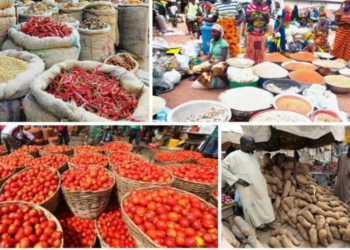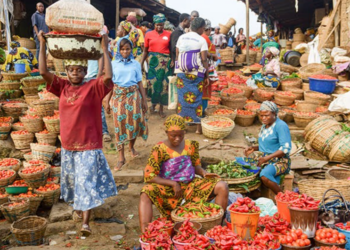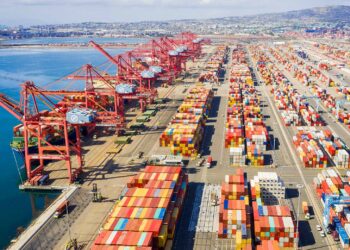Nigeria’s agricultural import continues to skyrocket despite the significant funding received by the sector and various measures put in place by the federal government to increase the agricultural productivity in the country.
According to the recently published foreign trade report by the National Bureau of Statistics (NBS), Nigeria’s agricultural import spiked by 140% year-on-year in Q1 2021. Nigeria imported agricultural items worth N630.18 billion in the period compared to N262.1 billion in Q1 2020.
This represents the highest quarterly Agric import recorded by Nigeria since 2016.
In the past two years, between Q2 2019 and Q1 2020, Nigeria has spent N3.1 trillion on agricultural imports.
READ: Food inflation will not come down as fast as the other aspects of inflation – Finance Minister

The rise in Agric imports has continued unabated despite hundreds of billions of naira in funding backed by the CBN’s initiatives. The apex bank explained that these intervention facilities, which aimed at stimulating output growth, had started to yield positive results. These initiatives include the Anchor Borrowers’ Program, Targeted Credit Facility, and Agri-Business Small and Medium Enterprise Investment Scheme (AGSMEIS).
Some of the intervention programs, as stated by the apex bank in its last MPC briefing, include N631.4 billion to 3.11 million smallholder farmers cultivating 3.8 million hectares of land, under the Anchor Borrowers’ program. Also, 29,26 beneficiaries received N111.7 billion for the AGSMEIS, while 548,345 beneficiaries have received N253.4 billion under the Targeted Credit Facility.
These interventions notwithstanding, Agric imports continue to rise, triggered by multiple devaluations of the naira, demand for higher input raw materials, and rising inflation. Much of Nigeria’s food consumption still relies significantly on the importation of food items to stimulate local production. For example, wheat remains an imported production input costing Nigeria about N222 billion in the first quarter of 2021 alone. It was N252 billion in the 4th quarter of 2020, translating to an annualized cost of N1 trillion ($2 billion).
Tepid growth despite measures
In 2019, the federal government announced that all land borders in the country were to be closed in order to tackle smuggling and other associated practices perpetrated through the borders.
- The borders were also closed in other to spur the domestic agricultural industry in the country. Furthermore, the central bank placed restrictions on the access to forex for the importation of food items, some of which include; rice, meat, chicken, and more recently, sugar and wheat.
- However, this has not yielded substantial results as the sector has only managed tepid growth in the past two years. This is despite being the highest employer of labour in the country.
- A cursory look at Nigeria’s GDP data shows that the agricultural sector grew by 2.28% in the first quarter of 2021, with an annual growth of 2.17% and 2.36% in 2020 and 2019 respectively.
- It also shows that the sector currently contributes 22.35% to the nation’s economy, a downturn compared to 26.95% recorded in the previous quarter.
Persistent increase in food prices
A major problem in Nigeria has been the access to food and the incessant increase in the prices of food items in various regions of the country.
- A situation that has been attributed to border closure, insecurity in the north, banditry, and kidnapping, EndSARS protest, devaluation of the naira, to list a few.
- Nigeria’s food index has increased by 32.3% between September 2019 and April 2021, which is only a weighted aggregate of the market reality.
- According to the Nairametrics market survey report which studies the prices of food items in major markets in Lagos State, a bag of pepper surged by as much as 85.7% in May 2021, while beans increased by 15.1% in the same period.
- Other items that have witnessed significant increases recently include flour, egg, tomatoes, noodles, pasta, bread, beverages, just to state a few.
Expert view
According to Suleiman Dikwa, the CEO of Green Sahara Farms, a major cause of the surge in agric imports is the inability of Nigeria to produce sufficiently for local consumption. He also reiterated that another major problem we face in Nigeria and Africa at large is that we export raw materials and bring in finished goods, which has affected our trade deficit over time.
“Yes, we have increased production. But what type of production have we increased? Have we increased the capacity and the standard of food quality and primary processing? Have we improved the capacity to transport this food in a manner that can be utilized by the industry? Not at all,” Dikwa explained.
He stated that we have to first go beyond production and have an integrated approach through the horizontal value chain where any increase in production capacity is met with a commensurate increase in primary processing.
The problem of insecurity in the northern areas was also mentioned as a factor affecting the production of food items in the country and how the big buyers and industries are not willing to risk deploying their systems to those areas but would rather find a way to import.
Mr Dikwa also suggested that the government should enable capacity and invest more in the land, as well as reduce importation by major players through the creation of economic clusters. “The government needs to sit with the companies and make direct economic investments into the needs of these companies,” he stated.
What we are importing
Some of the major agricultural items that Nigeria imports according to the latest foreign trade report include durum wheat, preparations of animals, blue whitings, malt, herrings, and other edible mixtures.
Nigeria imports some of these items from countries like Lithuania, Latvia, Denmark, Chile, Canada, Russia, France, USA, amongst others.























